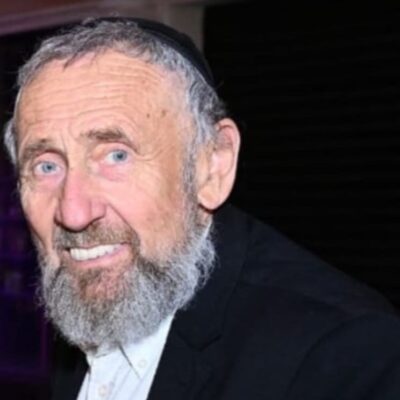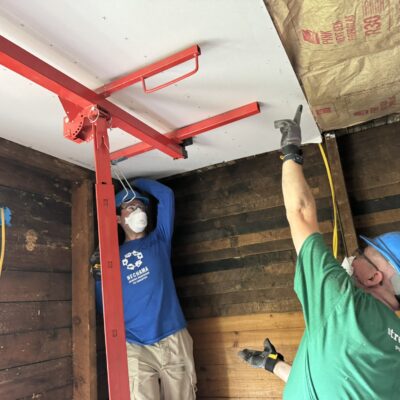Opinion
School with soul
Kids need more than ‘stories.’ They need transcendence.
In Short
Research shows that spirituality is a predictor of multiple markers of well-being, so why are we skimping on it in Jewish education?
At the tender age of twelve, I decided I wanted to instill in my future children a firm, abiding belief in God. It would be the faith I myself had possessed – before entering Jewish day school.
I was only eight when my conviction had begun to waver. In the day school classroom, the miraculous tales of the Torah were reduced to mere “stories,” and extraordinary events rationalized as natural occurrences. Later, academic discussions about the authorship of the Torah further whittled away at my belief, leading me to question the veracity of Moses’s divine connection. I was deeply enriched by my day school education and am grateful for it. But it’s not where I developed my relationship with God.

Courtesy
A child performs netilat yadayim at Tamim Academy of Queens in New York.
When the prospect of parenthood eventually became real, my inner 12 year old reemerged with my sense of urgency to reclaim the faith that my “conventional” Jewish education had eroded. I embarked on a deliberate journey of reconnection, immersing myself in Jewish mysticism and specifically in Chabad Chassidut. I even chose to marry a man who was more observant than I, confident that together we could create an environment steeped in Torah values. It was my attempt to “fake it ’til I make it,” not just for my own spiritual revival but primarily for the spiritual upbringing of my future children.
Thank God, this endeavor bore fruit. Both my personal spirituality and my eventual children’s faith flourished. Sacred moments abound in my life now, more frequently than ever before. As for my children, they are believers, each finding their unique path to connecting with the divine.
Why was it so crucial to me that my children cultivate a relationship with God? The answer lay in my own journey, in my yearning to restore what I had lost and to offer my children a sense of purpose, individuality, and significance that only spirituality can bestow.
It turns out that those instincts align with the findings of Dr. Lisa Miller, founder of Columbia University’s Spirituality Mind Body Institute. Dr. Miller’s research illuminates humanity’s intrinsic need for a spiritual connection, asserting that we are inherently wired to engage in a “personal transcendent relationship” with a Higher Power.
Furthermore, her work emphasizes the link between spirituality and well-being. Her findings indicate that children who foster a positive spiritual bond:
- are 40% less prone to substance misuse,
- exhibit a 60% lower likelihood of teenage depression,
- display an 80% reduced risk of engaging in risky sexual behavior, and
- demonstrate significantly elevated markers of thriving, including an increased sense of purpose and academic excellence.
Dr. Miller notes that teens in particular experience a “spiritual surge” in the second decade of life, during which “spiritual individuation” is the single most protective factor against the multiple risks associated with the tumult of adolescence.
Today it’s all the rage for the mention of anything spiritual, let alone the mention of God, to be met with skepticism, even suspicion. While many day schools have embraced curricula centered on social and emotional intelligence, the teaching of spirituality often remains informal, extemporaneous, or disproportionately linked to tefillah.
At Tamim Academy, however, we firmly believe that spiritual education is a fundamental pillar of holistic development – a narrative that evolves and matures in line with a child’s developmental stage. We have forged a comprehensive educational model that addresses every facet of a child’s development, seamlessly integrating Jewish knowledge, Hebrew language, and social, emotional, and spiritual growth into reading literacy, mathematics, creative arts, and critical thinking.
The Rebbe, Rabbi Menachem M. Schneerson of righteous memory, whose teachings played and continue to play a significant role in my own spiritual life, emphasized these ideas in a speech he delivered on his birthday in 1978. “Education, in general, should not be limited to the acquisition of knowledge and preparation for a career – or, in common parlance, ‘to make a better living,’” he said. “And we must think in terms of a ‘better living’ not only for the individual, but also for the society as a whole. The educational system must therefore pay more attention – indeed, the main attention – to the building of character, with emphasis on moral and ethical values.”
The Rebbe’s conviction was that an educational system must have a soul. Children are not computers to be fed a mass of information, disregarding their human needs for higher goals and ideals in life.
So let us focus on the importance of nurturing a child’s wonder and reverence. It is true that science has established a correlation between spirituality and well-being, lending empirical support to the endeavor; but this journey should also be undertaken simply because, as Jews, a “personal transcendent relationship” is our birthright – an integral part of our cultural and spiritual heritage.
As we mold the future of Jewish education, let us remain steadfast in our commitment to fostering not only academic excellence but also spiritual depth. Let us acknowledge that our children’s awe and curiosity are bridges to a realm beyond the empirical, a realm that can enrich their lives in immeasurable ways. By imbuing their educational journey with spirituality, we empower them to thrive emotionally, intellectually, and ethically, equipping them to embrace the world with open hearts and a profound sense of purpose.
Holly Cohen is a founder and the CEO of Tamim Academy, a growing network of new Jewish elementary schools across North America.

 Add EJP on Google
Add EJP on Google









